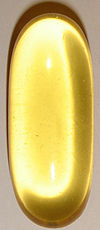 Are you performing a simple test to see if your fish oil is rancid and storing it properly to reduce the chances of it causing disease? Most of us take it for granted that our fish oil is safe and providing the many touted, wonderful benefits we often hear about. However, fish oil is harmful to one’s health if rancid and releases large amounts of free radicals in the body, which can cause cancer and other diseases.
Are you performing a simple test to see if your fish oil is rancid and storing it properly to reduce the chances of it causing disease? Most of us take it for granted that our fish oil is safe and providing the many touted, wonderful benefits we often hear about. However, fish oil is harmful to one’s health if rancid and releases large amounts of free radicals in the body, which can cause cancer and other diseases.
Typically fish oil is very beneficial. It contains essential omega-3 fatty acids, which are labeled “essential” because our bodies don’t make this substance, so we must get it from the food we eat or supplements we take. Omega-3s not only reduce inflammation, but they also have many other possible health benefits. These fatty acids have been shown to reduce blood pressure and blood triglyceride levels and may be helpful in reducing the inflammation associated with rheumatoid arthritis. There is also some evidence that omega-3s can reduce depression and anxiety, ischemic and thrombotic strokes, and cancer risks. Additionally, there is some evidence that it boosts immune function.
How Does Fish Oil Go Rancid?
This oil is primarily made of eicosapentaenoic acid (EPA) and docosahexaenoic acid (DHA), which are both highly unsaturated fatty acid components. The more a fat is unsaturated, the more likely it is to go rancid. In contrast to fish oil, for example, coconut oil, which is mostly saturated, can sit on the shelf a long time without turning rancid. However, the delicate, unsaturated nature of the fish oil fatty acids makes them very susceptible to light, heat, and air damage. When damaged, the fats in fish oil oxidize and become lipid peroxides, which cause free-radical damage, hence diseases, such as cancer, Alzheimer’s, etc. The theory of aging is also associated with free-radical damage.
How to Avoid Rancid Fish Oil
First, always check the expiration dates on the fish oil bottle, whether you are buying capsules or liquid. Buy the freshest fish oil possible, and the bottle should be a darkened container to reduce damage from light. Second, always buy them with antioxidants added, mainly vitamin E, which should include mixed tocopherols. Then, if taking capsules, bite into one each week to test for fishiness. If it is fishy (or if the liquid form is fishy), don’t swallow it, but spit it out instead. Also, throw out the entire bottle. Some research I read some time ago, showed that 1/2 the bottles tested had rancid fish oil in them. Another way to avoid fish oil turning rancid is to keep it in a cold, dark place.
I take Carlson’s Norwegian Cod Liver Oil with a light lemon flavor that comes in a green bottle, which I store in the refrigerator. I’ve been buying this product for nearly a year, and I’ve never had a rancid problem.